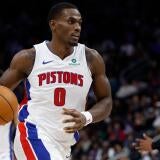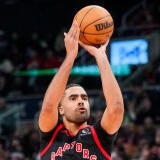
Where did things go wrong with the Knicks?
A look at how a year of optimism has devolved into losing, misery, and discord.
 What's happened to the Knicks is shocking. (USATSI)
What's happened to the Knicks is shocking. (USATSI)
The New York Knicks are 4-19. They have lost nine in a row. They are 25th in defensive rating, 21st in offense (a positive sign), and 25th in net points per possession. Andrea Bargnani was thought of as the last refuge of hope (which is a bad sign in and of itself), and he suffered a setback with his leg injury; he's out indefinitely.
And on Wednesday, apparent rifts in the organization, from internal team relationships to player-coach dynamics, came to light in an ESPN report. The players don't like the Triangle, the players are yelling at each other, Derek Fisher is just kind of hanging out, and there are no good times, come on.
There are three main elements to this. The triangle offense, the roster, and the plan.
THE TRIANGLE
What's funny is that, like I said before, the Knicks are 21st in offensive rating. So that's not great. They are 18th in effective field goal percentage. They're second in most passes per game. They're 15th in assist opportunities per game, which is down from the start of the year, but still decent.
In short, the offense is not good. For a team with shooters and a premier scorer, and who has gotten good contributions from Amar'e Stoudemire, they are a pretty awful disaster. So how is it a system that was supposed to open Carmelo Anthony's game up, that was supposed to get the most from Jose Calderon, that was supposed to provide more opportunities for the weak-side shooters, has instead fallen into disarray and general distrust, reportedly?
The problem is how the players feel about it and how that's affecting their comfort level. Those words, comfort level, seem ridiculous in the context of hyper-professional sports, right? Why would you care about how something feels, only if you're winning or at least in this instance, performing well? But this team is made up of something different than that. You have super-opinionated personalities here. J.R. Smith has been around long enough and made just enough money and gotten just enough accolades to garner a high level of pride. Carmelo Anthony knows what he knows and what he says goes. And the rest of the team is partially made up of followers, or players that have always followed the culture that existed from 2011 until last year when Phil Jackson took over.
And they are, by all accounts, not comfortable with all of this. There are things that go beyond the system, like practice habits, which they're also reportedly unhappy with. But there's an inherent distrust of the offense. That somehow seems to feed into the problem with Melo (as players reportedly believe he "shoots too much") and impacts Melo himself. Smith has been the most adamant that adjusting to the triangle has been a struggle, most likely because it teaches some level of control and discipline, and Smith has always been an instinctive, and impulsive, player.
That comfort level is huge. If a good player is struggling with a system, it's typically not because it puts them in the wrong spots or tells them to dramatically change their game. It's because they don't feel that comfort level. That's apparent with the Knicks, who can't get past how this situation feels vs. how it exists in reality.
THE ROSTER
In large part, the team is the issue. The triangle is getting the work done, even if the players don't feel all warm and cozy about it. But this roster is, to put it mildly, a disaster. It looked like it might be a disaster before the season, but it also looked like it might work out. It has not worked out, it is a disaster, and that's just how it goes sometimes. The plan wasn't an inherently bad one. Sometimes, you gamble on three to four iffy propositions and all of them come back negative.
But there's a lot of confusing things about their most worrisome side of the ball, defense. The Knicks play at the league's second-slowest pace, which helps boost a lot of their numbers. (You're not going to give up as many points if your opponent literally gets the ball the second-least times as against any other team.) But they're actually second among all teams in defensive field goal percentage allowed at the rim. They allow the second-least points off turnovers, the ninth least points on second-chance opportunities, the fourth-least transition points, and stunningly, the sixth-least points in the paint.
The only number that's really concerning is that they allow the tenth most shots from above the break in 3-point territory, and allow the fourth highest percentage. They even do a pretty good job against corner threes.
And yet there they are, with the seventh-worst defensive rating in the league.
The roster problem is mainly about fit. They don't have a distributor. Either at the elbow or on the wing, one of your triangle components has to be a facilitator. And while the Knicks' defensive numbers underneath are good, they do give up a decent amount of points on weak-side blown rotations. That's a product of thinking Samuel Dalembert and Jason Smith were going to replace Tyson Chandler, "chemistry problems" be damned.
Jose Calderon was supposed to be that facilitator, yet in his ten games back and 280 minutes played, the Knicks have a 95.1 points-per-possession mark, which is God awful. Given that Calderon is like the Charlie Brown Christmas Tree blowing in the wind on defense, him struggling to make the offense better is not good.
And their players with good defensive ratings (Quincy Acy, Samuel Dalembert, Tim Hardaway Jr.) have largely unappealing offensive numbers. (Hardaway Jr., ironically, the source of Melo's acrimony and who Anthony reportedly asked "Do you know who you're talking to?" with some curse words thrown in, has actually been decent on both ends of the floor.) Their bigs, particularly Jason Smith and Cole Aldrich who should be spot guys in eighth-to-ninth-man spots, have been atrocious.
The offense is awkward and low on weaponry, the defense is largely good in key areas, but lacks the magic word: effort.
So, then if the system isn't the problem, and the roster is the issue, why does the roster not fit the system?
THE PLAN
There are two ways of thinking about this.
1.) Phil Jackson, and by extension Derek Fisher knew that the rebuild was going to take time, and they weren't going to rush it. It's why they won't make any rash trades (like, oh, I don't know, trading a first-round pick for Andrea Bargnani). They are willing to suffer the slings and arrows of outrageous misery in order to get a top pick, keep their cap space open for Rajon Rondo, or LaMarcus Aldridge, Marc Gasol, or whoever in 2015, or for Kevin Durant in 2016. They want to be great, and they're willing to throw this team away now in order to get there.
2.) If that's the plan, to rebuild, to start over with a great draft pick and younger free agents, then why did they re-sign Carmelo Anthony for $122 million? Why keep a guy who has no time to waste on roster, especially when his skill-set is an ambiguous fit in the triangle to begin with. Why keep J.R. Smith on roster? Why play Cleanthony Early 54 minutes this season?
The Knicks seem like they're trying to do more than one thing at once. They wanted to be competitive, but now that that hasn't worked out, it's just "throw up your hands and hope it gets better or at least doesn't get worse."
Did Phil Jackson expect this to be this bad? Probably not, but he's also not particularly bothered by it. More concerning is this, and it is central to the plan.
Carmelo Anthony wants to win now, wants the ball in his hands, wants to score and feel comfortable doing it. He's reportedly the source of ire from his teammates, was the one who snapped at THJ when Hardaway Jr. said to "get a rebound." Anthony has long been said to be a "leader by example." LeBron James was widely that before he learned important lessons in Miami from Dwyane Wade, Mike Miller, and whoever else guided him. There was a marked change in him that second year in Miami. Anthony has never had that experience. He remains unwilling to vocally lead, but then, doesn't want anyone else to lead him.
Whether you believe that Anthony was behind the departure of Mike D'Antoni, or the exodus of Jeremy Lin, or not, is immaterial. There still seems to be a lingering culture of the Knicks that everything is to be tailored to fit Anthony. And that's why re-signing him was so dangerous for all parties involved. The Knicks don't want Anthony to run the show anymore, but they paid him the money and gave him the authority to be the face of the franchise.
Something, somewhere's going to have to change, beyond the defensive efficiency, beyond points in the paint or locker room drama. There's a culture that has to shift. The Knicks so far have been very casual in guiding it. But unless something shifts inside the locker room, this year isn't likely to get better. It's likely to only get more Knicks.

















